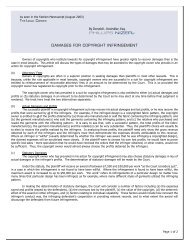International Charitable Giving And Planning ... - Phillips Nizer LLP
International Charitable Giving And Planning ... - Phillips Nizer LLP
International Charitable Giving And Planning ... - Phillips Nizer LLP
You also want an ePaper? Increase the reach of your titles
YUMPU automatically turns print PDFs into web optimized ePapers that Google loves.
The logic behind the IRS's conclusions in Rev. Rul. 63-252 is the following: Under theleading case of S.E. Thomason v. Comr., 6 amounts paid to a charity are not deductible ifthey are "earmarked" for a particular individual in a way that would, in effect, turncontributions of these amounts into gifts that would not have been deductible if madedirectly to that individual. By the same reasoning, channeling a gift to a foreign charitythrough a domestic charity that would not have been deductible if made directly to theforeign charity taints the contribution. On the other hand, contributions that are notearmarked for a specific foreign charity but could, in the discretion of a domestic charity,be passed on to a foreign charity in furtherance of the domestic charity's purposes aredeductible because domestic charities are permitted to conduct charitable activitiesabroad. This is particularly true where the funds are passing to a foreign charity that iscompletely controlled by the domestic charity.With this framework in place, the IRS developed, in Rev. Rul. 66-79, a new position thatrepresented a certain retreat from the disallowance of the charitable deduction inscenarios (i), (ii) and (iii) of Rev. Rul. 63-252. In the 1966 Ruling, the IRS indicated thatcontributions to a domestic charity that "at times solicits contributions which are used toprovide grants to [a] foreign organization... for specific purposes approved by [thedomestic charity's] board of directors in accordance with its bylaws" would be eligible forthe charitable deduction. This Revenue Ruling now forms the basis for the deductibility ofcontributions to a well-known class of domestic charities that style themselves as"friends" or "supporters" of foreign charities. The bylaws of the domestic charity that wasthe subject of Rev. Rul. 66-79 provided, among other matters, that the board of directorswould review all requests for funds, would require information about the purposes forwhich such funds would be used, would require a grantee to furnish a periodic accountingto show that the funds were expended for the purposes approved by the board, andcould, "in its absolute discretion," refuse to make any grants or otherwise provide fundsfor any or all purposes for which funds are requested. Under these circumstances, theIRS ruled that the contributions would be treated as deductible contributions to thedomestic charity, rather than as nondeductible contributions to a foreign charity.It should be noted that, under §509(a)(3)(C), a charitable organization may be recognizedas a public charity when it is operated exclusively for the benefit of, or to carry out thepurposes of, another public charity and is controlled by another public charity or"operated, supervised, or controlled by or in connection with" one or more publiccharities. Such organizations are often referred to as "support organizations." In Rev.Rul. 74-229, the IRS stated that a charitable organization can qualify as a "support"organization for a foreign public charity described in §509(a)(1). This raises thepossibility, suggested by several commentators, that a U.S. charity with some overlap inleadership with a foreign public charity but not controlled by the foreign charity couldqualify as a U.S. public charity, and that donations to it could be eligible for the incometax charitable deduction as long as it exercised its own discretion and independentjudgment in making distributions to the foreign charity. 7Domestic Business CorporationsDomestic business corporations may, like individuals, only claim the income taxcharitable deduction for contributions to U.S. charitable entities. However, under theflush language of §170(c)(2), "[a] contribution or gift by a corporation to a trust, chest,fund, or foundation shall be deductible... only if it is used within the United States or oneof its possessions." This means that a domestic business corporation can not claim acharitable deduction for a contribution to a U.S. charity that may be a "friend" or"supporter" of a foreign charity, pursuant to Rev. Rul. 66-79, unless the U.S. entity is acorporation. Since the reference to "foundations" in the flush language of §170(c)(2)predates the 1969 enactment of the private foundation rules, it would appear that acontribution by a domestic business corporation to a U.S. charitable corporation thatTax Management Estates Gifts and Trusts Journal © 2005 Tax Management Inc.® Pg. 6




